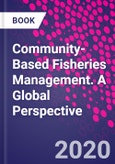Community Based Fisheries Management: A Global Perspective unravels the different aspects of CBFM from different continents and countries. At a time when the population is significantly increasing, with resources decreasing, this resource is directly relevant to helping communities understand and improve fishery production management in a sustainably way. Sections explore various scientific literature on the impact of community-based fishing, participatory management of water bodies, methodologies for studies on community-based fisheries management, and interviews of workers working on community-based fisheries. This information will be most useful to fish farmers, aquaculturists, fish and fishery scientists, research scholars and anyone else interested in this field.
Based on 30 years of scientific research, this resource emphasizes the need for the management of resources through the involvement of the local community while also providing a framework for participatory collaboration.
Please Note: This is an On Demand product, delivery may take up to 11 working days after payment has been received.
Table of Contents
1. Introduction2. Researchers' contribution3. Materials and methods4. Aspects of participatory management of water bodies5. Climate change, fisheries management and economics6. Community-based Fisheries Management across the globe
Authors
Devashish Kar Professor, Department of Life Science and Bioinformatics, and Dean, School of Life Sciences, Assam University, Silchar, India. Dr Devashish Kar is a pioneer and preeminent researcher in India in the fields of wetlands, rivers, fisheries, and aquaculture. He completed his master's program at the University of Gauhati with specializations in Fishery Science and Aquaculture. He was awarded a PhD by the University of Gauhati for his outstanding work in the "beel� (wetlands) fisheries of Assam. On a prestigious British Council Study Fellowship Award, Dr Kar was in King's College London for its nine-month Advanced Training in Science Education program. Dr Kar was awarded the prestigious Biotechnology National Associateship by the Indian government's Department of Biotechnology (DBT) for his pioneering research in the field of fish disease, particularly in tackling the dreadful epizootic ulcerative syndrome (EUS) fish disease in India and for conducting further research in defining EUS in collaboration with the National Institute of Virology, Pune. As convener, Dr Kar has organized a number of national and international symposia and workshops in the fields of wetlands, fisheries, and aquaculture, including ornamental fishes, in collaboration with DBT, DST, CSIR, ICAR, MOEF, UGC, and MPEDA. These events have been attended by preeminent scientific personalities, notably Prof. Asis Datta, Prof. Samir Bhattachryya, Dr K.C. Jayaram, and others. Dr Kar has presented papers and chaired scientific sessions at a large number of national and international symposia both in India and abroad, notably the Gordon Research Conference in the United States; 2nd International Symposium on GIS/Spatial Analysis in Fisheries and Aquatic Sciences in England during 2002; Lake Symposium at IISc, Bangalore (2000, 2002, 2010, 2012, and 2014, including chairing sessions); and Indian Science Congress (2012 and 2013, including chairing sessions), to name a few. He also has published in more than 190 national and international journals. Of particular note, 16 research scholars have been awarded MPhil and PhD degrees under his supervision. Professor Kar has authored 34 books (14 books singleauthored by him), including one published by Springer (London) and one in press with Elsevier (USA). Also, the book Community Based Fisheries Management is in press with Apple Academic Press (USA).As President of Conservation Forum, Dr Kar has made a profound contribution to the Society in Environmentrelated works in collaboration with Prof. Madhav Gadgil of the Indian Institute of Science (Retd.), Bangalore. In addition to being Editor of the Conservation Forum Journal, Dr Kar is a Scientific Fellow of the Zoological Society of London and a Fellow of the Linnean Society of London; Fellow of the Zoological Society, Calcutta; Fellow of the Applied Zoologists Research Association; Fellow of the Society of Environmental Biologists; Fellow of the Inland Fisheries Society of India; and others. At the moment, Dr Devashish Kar is seniormost Professor and the Dean of the School of Life Sciences in Assam (Central) University at Silchar, India.








